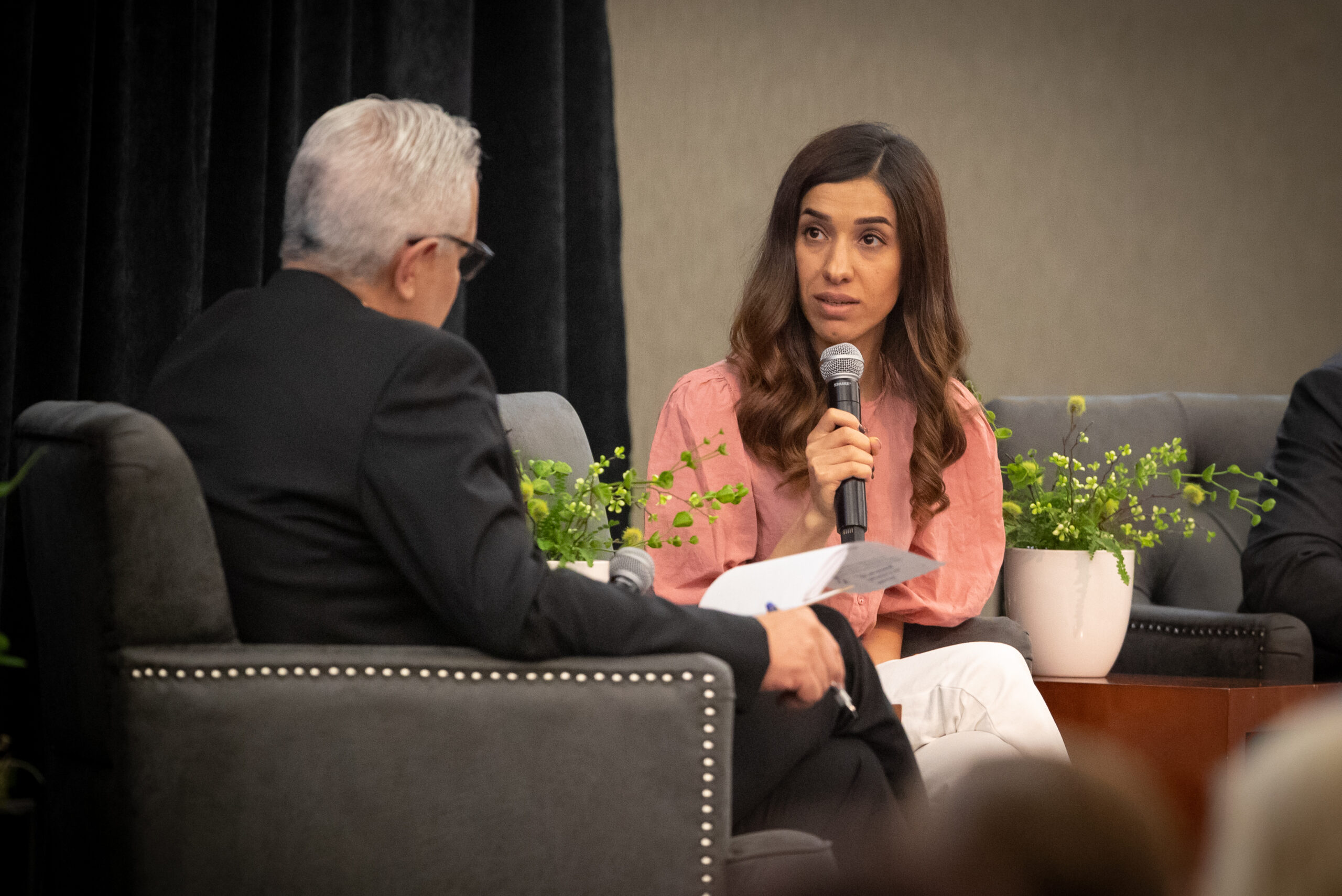Nadia Murad, an Iraqi Yazidi human rights activist, author of “The Last Girl: My Story of Captivity and My Fight Against the Islamic State,” and the winner of the 2018 Nobel Peace Prize, gave a lecture on Monday at Creighton as a part of the Global Scholars Lecture Series.
Opening remarks for the event were provided by Lizzy Curran, Creighton’s global programs coordinator, Creighton president the Rev. Daniel Hendrickson, S.J. and René Padilla, vice provost for global engagement.
Murad’s address sold out the Harper Center Ahmanson Ballroom. The event was a part of Murad’s ongoing effort to advocate for her Yazidi people and encourage others to get involved in the fight for justice against Islamic terror groups.
Hendrickson delivered a few words about Nadia Murad’s background to the audience as a preface for the lecture, which functioned more as an interview facilitated by Padilla.
“On Aug. 15 of 2014, at the age of 19, Nadia was captured by ISIS troops during a raid on her village,” Hendrickson said. “More than 600 Yazidi men were murdered, including six of Nadia’s brothers and stepbrothers. Some 500 women were captured and condemned to slavery and sexual abuse. Three months later, Nadia escaped and made her way to a refugee camp, and from there to Germany, where she now resides.”
The Yazidi are a small religious minority located mainly around northern Iraq. The attack by ISIS displaced thousands of Yazidis, who now reside in places like Germany, Greece and Australia.
The majority of Yazidis that stayed in Iraq are now displaced inside their own country in internally displaced persons (IDP) camps.
“ISIS’s goal is being accomplished against Yazidis in the moment,” Murad said. “We have all failed to help them return home to their own way of life.”
She said this problem continues to occur because the responses from local governments regarding the issue have been overwhelmingly negative.
“They have not taken the action they should,” Murad said. “Close to 3,000 women and children are still missing, including some of my own family members. Because of the negative responses from local governments, we have not been able to accomplish searching for them. There are different leaders who have responded positively and supported us, and there are others that we are still working with.”
College of Arts and Sciences junior Mary Kate Garriott attended Murad’s lecture because she read online about Nadia’s Initiative, a non-profit that advocates for victims of sexual violence, and wanted to hear more about her story.
“I think the most impactful message from Nadia was that when we stand together, we can create good,” Garriott said. “Her hope for the future clearly outweighs her fear for the Yazidi people, as is shown with her dedicating her life to advocacy. Because of the dispersion of the Yazidi population, she mentioned being scared of the possibility of their culture and religion not continuing. But her desire for us to come together and work for peace and justice was her clear message. We can read a number of victims or a news article of pain and not react because it seems so far way, but it is our responsibility to do something.”
When asked what people in the United States can do to amplify her message and contribute to a solution, Murad responded by saying that when we come together, we can do something better than what the group against us is doing.
“We can help a child who is missing to be found. We can help a family get home. We can come together to help those who are suffering,” Murad said.
Murad said that she was “very happy” to be speaking at Creighton. Her hope was that she could take the voices of the audience with her and use them in the fight against injustice to the Yazidi people.
“My hope is to mobilize the good against the evil,” Murad said.
